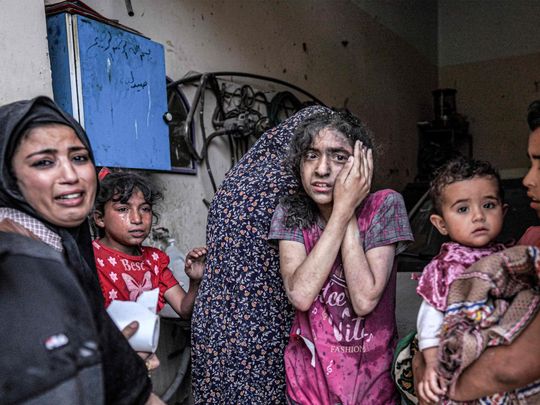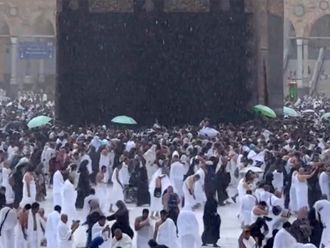
RIYADH: Hamas has been offered a 40-day ceasefire and the release of “potentially thousands” of Palestinian prisoners in return for freeing Israeli hostages, British Foreign Secretary David Cameron said Monday.
The Palestinian militant group has been given “a very generous offer of sustained 40 days ceasefire, the release of potentially thousands of Palestinian prisoners, in return for the release of these hostages,” Cameron told a World Economic Forum meeting in Riyadh.
US top diplomat Antony Blinken said earlier he was “hopeful” Hamas would accept the latest proposal for truce and hostage release deal as negotiators from the Palestinian group were due in Egypt.
Egypt, Qatar and the United States have been trying to mediate an agreement between Israel and Hamas for months, and a recent flurry of diplomacy appeared to suggest a new push towards halting the fighting.
Talks “are taking place in Cairo today”, said Al Qahera News, which is linked to Egyptian intelligence services.
It was not clear whether the Hamas delegation had already arrived, but Qatari mediators were also in Cairo according to a source with knowledge of the talks.
A senior Hamas official said Sunday the Palestinian militant group had no “major issues” with the most recent truce plan.
Blinken - on his seventh visit to the region since the October 7 Hamas attack that sparked the war - told a World Economic Forum meeting in Saudi Arabia he was “hopeful” Hamas would accept a truce.
“Hamas has before it a proposal that is extraordinarily, extraordinarily generous on the part of Israel,” Blinken said, urging the group to “decide quickly”.
“I’m hopeful that they will make the right decision.”
Speaking at the same meeting, Egypt’s Foreign Minister Sameh Shoukry said “the proposal has taken into account the positions of both sides.”
While there was no “final decision” yet, Shoukry said: “We are hopeful... I hope that all will rise to the occasion.”
The war has brought the besieged Gaza Strip to the brink of famine, UN and humanitarian aid groups say, reduced much of the territory to rubble and raised fears of a wider regional conflict.
In southern Gaza, an AFP correspondent, witnesses and rescuers reported air strikes overnight on Rafah, where the majority of Gaza’s 2.4 million people have sought refuge near the border with Egypt.
At least 22 people were killed in the city, medics and the Civil Defence agency said, with witnesses telling AFP at least three houses had been hit.
‘Living in hell’
A Hamas source close to the talks has told AFP the group is keen for a deal that “guarantees a permanent ceasefire, the free return of displaced people, an acceptable deal for (a prisoner-hostage) exchange and an end to the siege” in Gaza.
In Israel, protesters have demanded that the government secure the release of the 129 hostages estimated to remain in Gaza including 34 the military says are dead.
They were seized during Hamas’s October 7 attack on southern Israel that triggered the war and resulted in the deaths of about 1,170 people, mostly civilians, according to an AFP tally of Israeli official figures.
Israel’s retaliatory offensive has killed at least 34,488 people in Gaza, mostly women and children, according to the health ministry in the Hamas-run territory.
The tally includes at least 34 deaths in the past 24 hours, a ministry statement on Monday said.
Israel has pledged to pursue Hamas battalions in Rafah despite mounting global concern for civilians sheltering there, but Foreign Minister Israel Katz said the government may “suspend” the invasion if an agreement is reached.
Blinken reaffirmed US opposition to the planned Israeli offensive.
“We have not yet seen a plan that gives us confidence that civilians can be effectively protected,” he said.
High temperatures in crowded Rafah have turned makeshift shelters made from plastic tarps into sweltering ovens.
“We’re living in hell,” said displaced Palestinian Hanane Saber, 41.
The UN agency for Palestinian refugees, UNRWA, has said that “as the weather gets warmer, the risk of disease spreading increases”, a threat exacerbated by uncleared rubbish.
According to the Hamas source, the latest plan proposes an Israeli withdrawal from two main roads through the coastal territory to allow Gazans to return to the heavily impacted north.
Hamas negotiator Zaher Jabareen told AFP that “success or failure” will be determined by “the ability to reach a permanent ceasefire decision” - a condition Israel has rejected before - and to agree “clear” plans for reconstruction of war-battered Gaza.
The Axios news website, citing Israeli officials, reported that Israel’s latest proposal includes a willingness to discuss the “restoration of sustainable calm” after hostages are released.
Hostage release talks
As diplomatic efforts intensified, a State Department official said Blinken will also travel to Israel and neighbouring Jordan later this week.
His Saudi counterpart, Foreign Minister Prince Faisal bin Farhan, said Sunday the international “political system” had failed in its response to the “catastrophe” in Gaza.
Prince Faisal told the WEF summit that only “a credible, irreversible path to a Palestinian state” will prevent the world from confronting “this same situation” again in the future.
Israeli Prime Minister Benjamin Netanyahu’s hard-right government has rejected calls for Palestinian statehood.
Palestinian president Mahmoud Abbas, whose Palestinian Authority is based in the Israeli-occupied West Bank, appealed at the WEF meeting for the United States to stop Israel from invading Rafah, which he said would be “the biggest disaster in the history of the Palestinian people”.
In February, Netanyahu said any truce deal would only delay - not prevent - a Rafah operation.
War cabinet member Benny Gantz said that “Rafah is important in the long struggle against Hamas” but also that the Israeli government “will not have the right... to exist” if it blocks a deal to free the captives.
Media reports said the Israeli government had authorised its negotiators to discuss the initial release of fewer than the 40 hostages it had previously demanded during the first phase of a truce.
US President Joe Biden spoke with Netanyahu by phone Sunday about the truce negotiations and “increases in the delivery of humanitarian assistance into Gaza”, the White House said.
They discussed “preparations” to open new crossings to northern Gaza, where conditions have been particularly dire, it added.
Elsewhere, Hamas’s armed wing claimed a barrage of rockets fired from Lebanon at a military position in northern Israel, though the military reported no casualties or damage.












